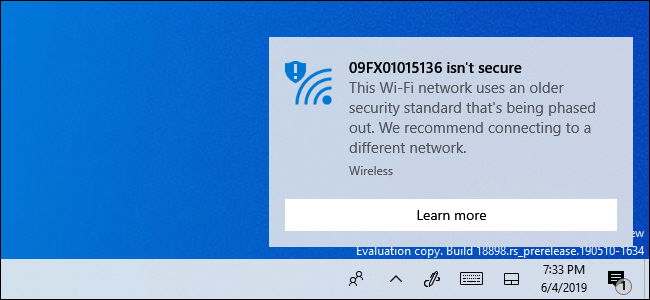
Windows 10 now warns you that a Wi-Fi network “isn’t secure” when it’s using “an older security standard that’s being phased out.” Windows 10 is warning you about WEP and TKIP. Here’s what that message means—and how to fix it.
Starting with the May 2019 update, Windows may show you a message stating your network isn’t secure, even if you know you use a password. If you see this message, then you’re likely using either Wired Equivalent Privacy (WEP) or Temporal Key Integrity Protocol (TKIP) encryption. These encryptions aren’t safe to use, and you should switch to a newer protocol or replace your router as soon as possible.
Why Windows 10 Is Warning You

You probably know you should password protect your Wi-Fi network. Whether it’s to keep the neighbors or roaming bad actors out of your system, it’s just best practice to secure your wireless network. But, when you add a password to your Wi-Fi router, you aren’t just keeping people off your network. The security protocol encrypts your data to prevent anyone in the area from listening in on what you’re doing.
Several methods of encrypting your Wi-Fi exist: WEP, WPA, and WPA2. WPA3 is on the way, too. WEP is the oldest and least secure at this point. Look at this way; the Wi-Fi Alliance ratified WEP in 1999, which makes the standard older than Windows XP, YouTube, and the original iPod. WPA-TKIP was endorsed back in 2002.
That’s why Windows warns you about these networks with the following warning:
[Network Name] isn’t secure
This Wi-Fi network uses an older security standard that’s being phased out. We recommend connecting to a different network.
No comments:
Post a Comment